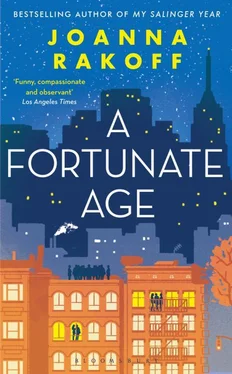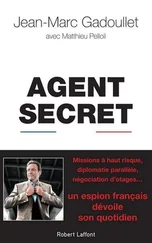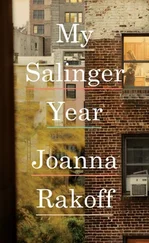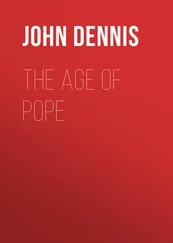But perhaps the most interesting adherent of Mr. Green-Gold’s ideas is a person generally not associated with radical causes: Soho dress designer Susanna Chang. Known for her charming, retro frocks—rendered in lush silks, adorned with ribbons and bows and beads—Ms. Chang has “never had any interest in politics.” “For ten years, I had tunnel vision,” she explained, speaking over the phone from her Greene Street atelier. “I didn’t think about anything but building my business.” All that changed six months ago when Mr. Slikowski—a former beau of Ms. Chang—introduced the designer, a petite brunette habitually clad in kitten heels and knife-pleated skirts (“I run them up myself on my old Singer…”), to Mr. Green-Gold. The activist—a self-described “anarchist” who “doesn’t know anything about fashion”—and the fashionista immediately hit it off.
Rose cast her eyes down the page. “All this is about the designer. Okay, here we go.”
Upon their initial meeting, Ms. Chang told Mr. Green-Gold that she’d love to help out PrisonBreak in whatever way she could. The two stayed in touch, but it wasn’t until last week that Mr. Green-Gold called Ms. Chang into action.
And so it was that on Friday evening, sixty attractive young people marched into the Grand Ballroom at the St. Allen, clad in sumptuous evening clothes designed by Ms. Chang and constructed by her Brooklyn seamstresses over a feverish five-day period. Though the styles of the women’s dresses differed—from a full-skirted strapless gown that called to mind Dior’s New Look, to a close-cut, curve-hugging number with a plunging V-neck—they were all cut from the same cloth: bold black and white stripes, the sort that once adorned prison uniforms. The men’s tuxedos used this same cloth, to alarming effect.
These well-dressed young people were not exactly invited to the event they attended: Crown’s annual executive dinner, attended by 200 of the company’s top executives and big investors. Crown operates most of the nation’s prisons—as well as many of its top hotels, including the St. Allen—and, as such, is the leading target of the PrisonBreak campaign. “Crown has a direct interest in keeping our prisons filled, which means they have a direct interest in perpetuating the racist, classist inequities of contemporary American society,” said Mr. Green-Gold. Ms. Chang’s costumes were meant to show Crown exactly how “fine the line is between prisoner and hotel guest.”
At 7:00 p.m., Crown executives and investors arrived in the Grand Ballroom for cocktails and hors d’oeuvres. At 7:30, Mr. Green-Gold’s “operatives”—as he jokingly refers to them—began to filter into the crowd, a few at a time. At 8:00 p.m., when the group moved into the seating area for the banquet, the rest of the prison activists—including Mr. Green-Gold, his wife, Ms. Chang, Mr. Slikowski, and Ms. Gordon—joined them. Slowly, the protesters formed a human chain around the curtained edge of the ballroom. The first speakers stepped up to the podium, the guests wondering exactly what the silent young people, in their matching outfits, were doing. At 8:45, Charles Harris, the company’s chief financial officer, strode over to one of the protesters—journalist William Hayes—and asked, sotto voce, what was going on. “I didn’t want to make a scene, call security, that kind of thing,” said Mr. Harris, speaking from his midtown office yesterday. “There were a lot of very pretty girls. And they were all very quiet and well behaved.”
Initially, perhaps. After Mr. Harris approached Mr. Hayes, the protesters began milling through the banquet hall, passing out leaflets emblazoned with the phrase, “Stop Building Prisons.” After a brief period of confusion, Mr. Harris and a group of executives tried to force the protesters out of the ballroom. Hotel security was called. But before in-house officers arrived, a skirmish broke out involving Mr. Harris, Mr. Hayes, Mr. Green-Gold, and several unidentified protesters and Crown employees. Hotel security officers broke up the fight and turned Mr. Green-Gold and Mr. Hayes over to the city police officers who arrived soon after. Several other protesters were detained for questioning, but their names have not yet been released, for reasons of security. The matter has been turned over to the Federal Bureau of Investigation, which has been monitoring Mr. Green-Gold’s activities for “at least a year,” according to a source who spoke on the condition of anonymity.
As Mr. Green-Gold was led out of the hotel, into the waiting police car, he cried, “I’ve already got my uniform” and “A thousand more bucks for Crown.” And he looked great as he did it.
Rose stopped. “The rest is about the designer,” she said. “She avoided the fracas, it seems.” Sadie nodded, then met her mother’s eyes. Suddenly, the two women burst out laughing. “He looked great as he got into that police car,” said Sadie, through giggles. “Actually, he does look pretty swell,” said Rose. Sadie took the paper from her hand. On the first page, bottom left, was a color photo of Rob Green-Gold, smiling broadly and clad in what would indeed have been a smart tuxedo were it not for the white stripes. His eyes, she saw now, were a bright, appealing green. Off to one side, she saw Caitlin, in a floor-length, tailored gown, her hair pulled to the top of her head in what looked to be an elaborate chignon. Long gloves covered her arms. And—was that… yes!—a small tiara glittered atop her head.
“So do you know this boy?” asked Rose. “Is he a friend of Tuck’s?” Sadie nodded.
“A very old friend, from childhood. I don’t know him, really. He married a woman named Caitlin Green, who was in our class at Oberlin. She and Lil are friendly, and the four of them hang around together. Partly because of proximity, I think. They live right down the street from each other.” Sadie pointed to Caitlin. “That’s his wife.” Rose laughed.
“The glamour puss? With the long gloves? She’s bad news.” Sadie stared at her mother.
“What makes you say that, Mom? Just from a picture?”
“ Look at her,” Rose cried. “The gloves! The tiara ! She’s completely ruined that lovely dress by piling on all that junk. Where did she even get a tiara?” Sadie laughed. “I bet this whole thing was her idea. I mean, the girl’s married to this boy who probably walks around in jeans and a Save the Whales T-shirt all the time. And he’s some kind of vegetarian. He’s devoted his life to this cause .” Rose Peregrine had no patience for people who devoted their lives to “causes,” placing them in the same camp as born-again Christians and devotees of avant-garde theater. “She probably dreamed up this whole thing just so she’d have a chance to get dressed up, poor thing.” And there I was , Sadie thought, smiling, telling her to get dressed up. Then a phrase came floating out at her—“ constructed over a feverish five-day period .” Had she had a hand in this? It could be. The thought, strangely, pleased her.
“You’re probably right, Mom,” she said.
“Of course I’m right, Sadie. Give me a little credit. I’ve been around the block. That girl set this whole thing up and roped Tuck into it, too, no doubt. There’s a certain type of girl who wants to have men fighting over her all the time.”
“You really think Caitlin set up this whole elaborate protest to get attention for herself?” Sadie asked.
Rose considered. “No. The boy was probably planning the protest. The costumes were probably her idea. No straight man would think of something like that, right?” She took the paper back from Sadie and opened it to the middle page, where the story continued. “Look, there’s another picture.” She ran one manicured finger along a large black-and-white shot of the protesters lined up against the back of the hall. It was a rather remarkable sight—the row of young people in identical stripes, the women beautiful and dewy, the men handsome and stalwart. Ed Slikowski, Sadie thought, could stand to wear a suit more often. In person, he’d seemed much more slight, boyish. “There’s Tuck,” said Sadie, tapping her finger on the page.
Читать дальше












